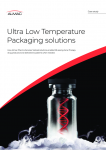Severe winter storm wrought havoc on pharma supply chain

The winter storm that hit North America in mid-February 2021 was not your average stretch of freezing and flurries. The severe weather event (unofficially dubbed “Winter Storm Uri”) ran through much of the US, parts of Canada, and even northern Mexico, with extended impacts like unprecedented power and water shortages in Texas, a state not used to snow and ice.
In addition to the staggering number of fatalities (about 136 people died as a result of the storm, making it the deadliest North American winter storm in a quarter-century), Uri rocked the supply chain. Such extended, severe weather events frequently cause slowdowns and interruptions, and this one was no exception.
Experts at supply chain specialist FourKites kept a key eye on the winter storm as it approached, struck, and faded for potential impacts to the supply chain, in pharma and other industries. According to the company, while professionals knew the storm was bearing down, supply chains struggled to respond quickly and nimbly enough to avoid the disruptions that resulted.
According to Glenn Koepke, FourKites senior vice president of customer success, the pharmaceutical industry was particularly hard hit. The pharma supply chain saw a sharp decline in shipments, even compared to other fields (on-time deliveries dropped 36% the week of February 14, while industries overall declined about 32%); average dwell time (the stretch a load sits waiting for pick up or drop off) for pharma shipments soared 308%, compared to a 5% average dwell increase across all industries.
Outsourcing-Pharma connected with Koepke, to talk about the unusual circumstances and impact of Winter Storm Uri, how it affected the pharmaceutical supply chain, and what the key takeaways from the severe weather event might be.
OSP: Could you please talk about how unusual the storm that hit Texas in February was? Were supply chain professionals overall caught completely off guard?
GK: Supply chain professionals had awareness the storm was coming and many were able to proactively shut down operations, operate at a reduced shift, or operate in a remote environment. The challenge with the storm in mid-February is trucking capacity and pricing has remained very volatile post-holidays where demand usually slows down but not nearly as much in 2021.
Couple the capacity challenges along with that Texas is a major artery for trucking capacity to the surrounding states, we say supply chains stop volumes because of the shutdown. This impacted order volume significantly during the week. The storm's initial impact was from Saturday to Wednesday so there was still time later in the week to get freight shipped that was required so supply chains could recover.
OSP: Could you please talk about the short-term impact on the pharma supply chain, and what effects (if any) might be felt down the road?
GK: The short-term impact was having to utilize the inventory on hand to meet demand from customers. Since pharma like other industries, operates with a level of supply, the supply chains can weather a storm and quickly recover.
OSP: Could you please share some of the reasons the pharma supply chain was relatively hard hit?
GK: Pharma volumes weren't hit as hard as manufacturing. Although volumes dropped, the impact to patients isn't a one-to-one correlation due to levels of supply on hand and freight going through distribution channels.
OSP: Similarly, you mention retail was better able to get through and respond to the storm, compared to other industries—could you please share why, and what lessons other industries could take away from their experience?
GK: Retail often gets prioritized during storms, and food and beverage products and CPG are key for consumers, so this freight typically gets prioritized in disruptive events. On the other hand, manufacturing and other industries (if they're shipping non-critical product) will wait for events and capacity to free up.
OSP: Similarly, what if anything could pharma supply-chain professionals do to safeguard, so they’re not as hard hit by the next storm (surprise or no)?
GK: Inventory planning, shifting product closer to consumers and key distributors, and agile planning so stock can be fulfilled from other fulfillment operations. All of these areas can help any supply chain. Where pharma gets impacted more than other industries is if parcel terminals or courier operators are shut down, given this a key mode for many pharma companies.
OSP: Could you please share some solid advice for supply chain professionals to help them be better prepared, and more resilient, for the next adverse event that might strike?
GK: Supply chains need to have order visibility and safety stock, and they need to leverage predictive models to understand the impact on their business. Supply chains that are leveraging these are less likely to be impacted by these events.
Although volume may drop, it doesn't mean customers are being impacted if they are proactive about the criticality of customers’ orders and can source the order in ways to meet the customer needs.
















